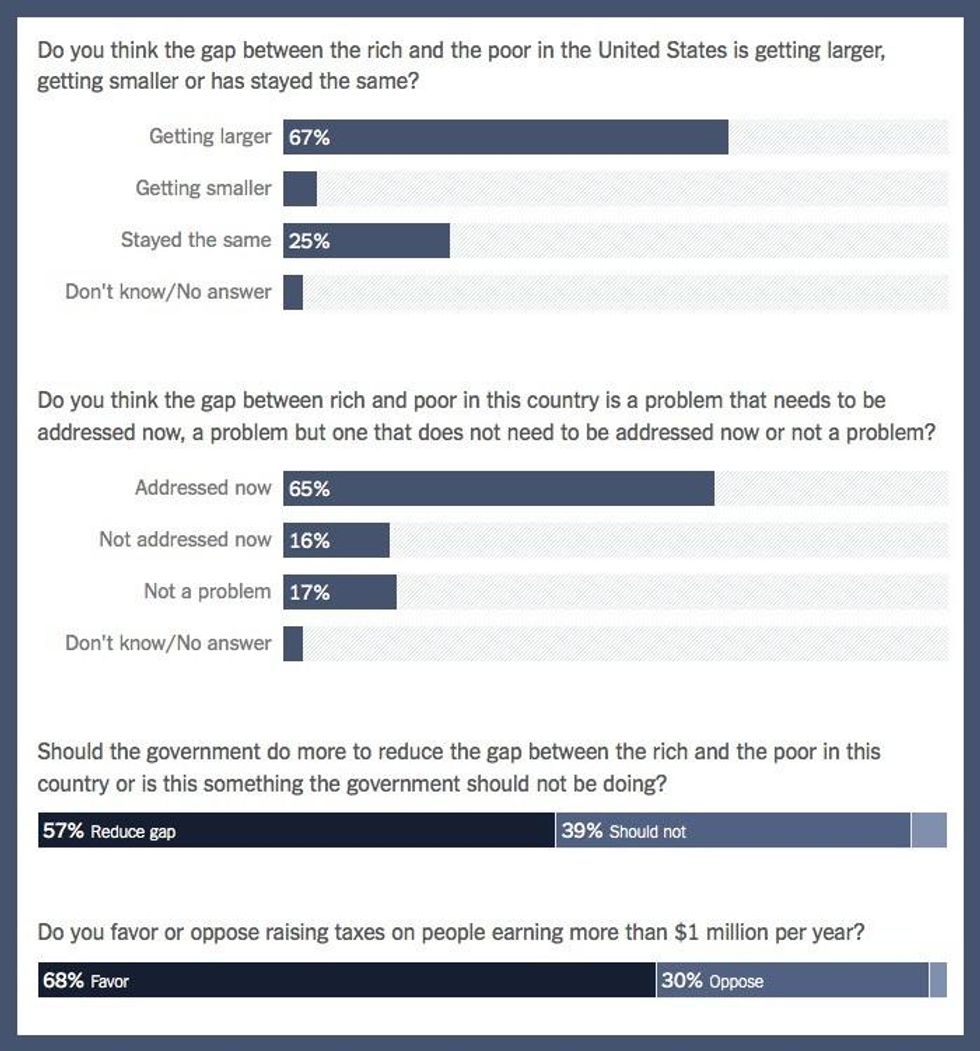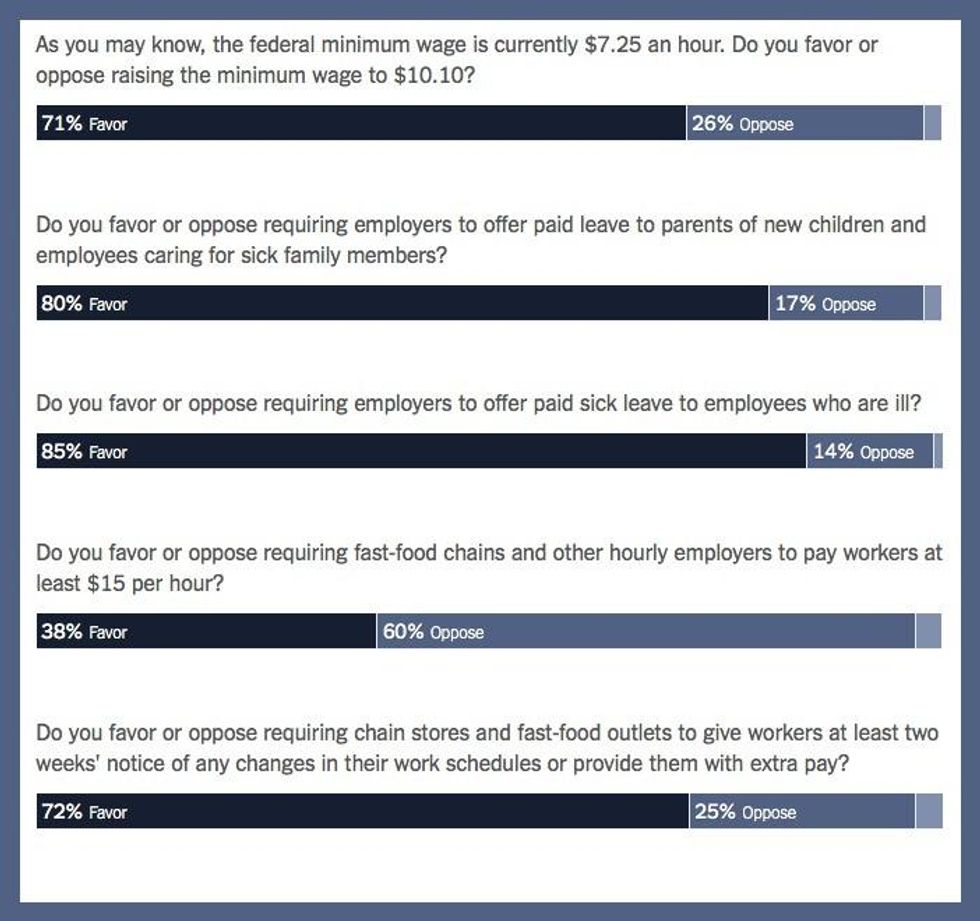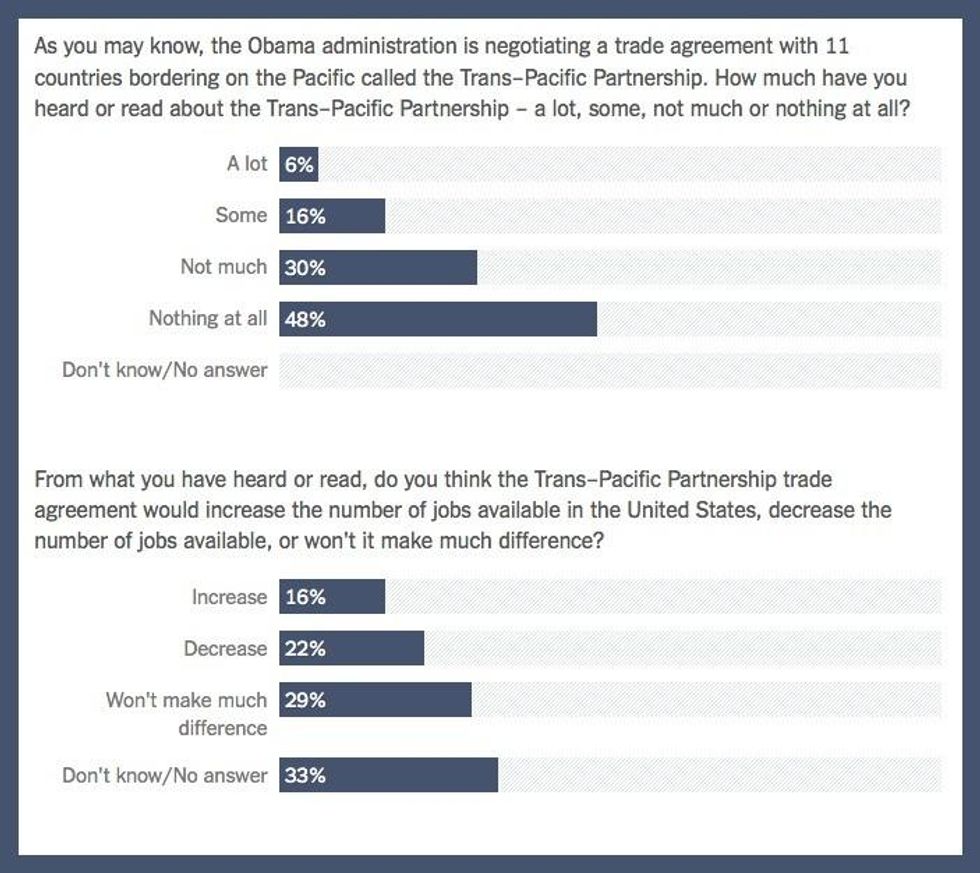

SUBSCRIBE TO OUR FREE NEWSLETTER
Daily news & progressive opinion—funded by the people, not the corporations—delivered straight to your inbox.
5
#000000
#FFFFFF
To donate by check, phone, or other method, see our More Ways to Give page.


Daily news & progressive opinion—funded by the people, not the corporations—delivered straight to your inbox.

In total, the new survey covered three areas of interest - economic inequality, workers' rights, and international trade - and found, at least in broad strokes, overwhelming support for the positions of most progressives.
The populist sentiment that is sweeping the nation has both a source and a solid base, according to new polling that shows a majority of Americans feel like the growing gap between the rich and the poor is cause for serious concern and should be proactively addressed by government policies.
The new poll, conducted jointly by the New York Times and CBS News, found that a "strong majority"--more than six out of 10 people across party lines--think the nation's "wealth should be more evenly divided" among its people and only slightly less (with Republican support falling off) think government policies should drive the effort to reduce the gap between the rich and the poor.
The survey covered three areas of interest—economic inequality, workers' rights, and international trade—and found, at least in broad strokes, overwhelming support for the positions of most progressives.
In abbreviated terms, the results show that Americans: 1) Recognize and dislike current levels of economic inequality and want something done about it; 2) Think low-wage workers deserve a significant raise, paid sick and parental leave, and better workplace protections; and 3) Don't know much about pending so-called "free trade deals" being negotiated in secret and largely ignored by the mainstream media, but what they do know, they don't like very much.
On specific policies that could help reduce inequality, 68 percent of respondents said they would support raising taxes on individuals who make more than $1 million a year.

The findings of the poll, according to the Times,
help explain the populist appeals from politicians of both parties, but particularly Democrats, who are seeking to capitalize on the sense among Americans that the economic recovery is benefiting only a handful at the very top.
Far from a strictly partisan issue, inequality looms large in the minds of almost half of Republicans and two-thirds of independents, suggesting that it will outlive the presidential primary contests and become a central theme in next year's general election campaign.
The survey also looked at people's sentiments regarding workers' rights in the country and showed that, across the board, support exists for stronger protections, better wages, and increased worker benefits. Among those questions, more than 71 percent think the federal minimum wage should be raised from its current rate of $7.25 per hour to $10.10; a larger majority (81 percent) favor policies that would require employers to offer paid parental leave, and a still larger proportion (85 percent) think an increase of paid sick leave for workers is a good idea.
Strikingly, there was significantly less support for the idea that fast-food restaurant employees and other low-wage workers should enjoy the $15 minimum wage a growing number of them are fighting for, but a large majority of people believe that scheduled workers in those industries should have better protections when it comes to their scheduling.

Another finding that will bolster the position and arguments of many progressives--as they continue their fight against the Trans-Pacific Partnership agreement and Fast Track authority that would give the Obama administration (and his successor) the ability to rush through the TPP and other corporate-friendly deals like TTIP and TISA in the future--is that essential support for such deals is low. Additionally striking is how little Americans feel they know about these deals, which supports critics' argument that the mainstream and corporate media have done a terrible job of informing the public about such complex and secretive agreements over the last year or more.

Trump and Musk are on an unconstitutional rampage, aiming for virtually every corner of the federal government. These two right-wing billionaires are targeting nurses, scientists, teachers, daycare providers, judges, veterans, air traffic controllers, and nuclear safety inspectors. No one is safe. The food stamps program, Social Security, Medicare, and Medicaid are next. It’s an unprecedented disaster and a five-alarm fire, but there will be a reckoning. The people did not vote for this. The American people do not want this dystopian hellscape that hides behind claims of “efficiency.” Still, in reality, it is all a giveaway to corporate interests and the libertarian dreams of far-right oligarchs like Musk. Common Dreams is playing a vital role by reporting day and night on this orgy of corruption and greed, as well as what everyday people can do to organize and fight back. As a people-powered nonprofit news outlet, we cover issues the corporate media never will, but we can only continue with our readers’ support. |
The populist sentiment that is sweeping the nation has both a source and a solid base, according to new polling that shows a majority of Americans feel like the growing gap between the rich and the poor is cause for serious concern and should be proactively addressed by government policies.
The new poll, conducted jointly by the New York Times and CBS News, found that a "strong majority"--more than six out of 10 people across party lines--think the nation's "wealth should be more evenly divided" among its people and only slightly less (with Republican support falling off) think government policies should drive the effort to reduce the gap between the rich and the poor.
The survey covered three areas of interest—economic inequality, workers' rights, and international trade—and found, at least in broad strokes, overwhelming support for the positions of most progressives.
In abbreviated terms, the results show that Americans: 1) Recognize and dislike current levels of economic inequality and want something done about it; 2) Think low-wage workers deserve a significant raise, paid sick and parental leave, and better workplace protections; and 3) Don't know much about pending so-called "free trade deals" being negotiated in secret and largely ignored by the mainstream media, but what they do know, they don't like very much.
On specific policies that could help reduce inequality, 68 percent of respondents said they would support raising taxes on individuals who make more than $1 million a year.

The findings of the poll, according to the Times,
help explain the populist appeals from politicians of both parties, but particularly Democrats, who are seeking to capitalize on the sense among Americans that the economic recovery is benefiting only a handful at the very top.
Far from a strictly partisan issue, inequality looms large in the minds of almost half of Republicans and two-thirds of independents, suggesting that it will outlive the presidential primary contests and become a central theme in next year's general election campaign.
The survey also looked at people's sentiments regarding workers' rights in the country and showed that, across the board, support exists for stronger protections, better wages, and increased worker benefits. Among those questions, more than 71 percent think the federal minimum wage should be raised from its current rate of $7.25 per hour to $10.10; a larger majority (81 percent) favor policies that would require employers to offer paid parental leave, and a still larger proportion (85 percent) think an increase of paid sick leave for workers is a good idea.
Strikingly, there was significantly less support for the idea that fast-food restaurant employees and other low-wage workers should enjoy the $15 minimum wage a growing number of them are fighting for, but a large majority of people believe that scheduled workers in those industries should have better protections when it comes to their scheduling.

Another finding that will bolster the position and arguments of many progressives--as they continue their fight against the Trans-Pacific Partnership agreement and Fast Track authority that would give the Obama administration (and his successor) the ability to rush through the TPP and other corporate-friendly deals like TTIP and TISA in the future--is that essential support for such deals is low. Additionally striking is how little Americans feel they know about these deals, which supports critics' argument that the mainstream and corporate media have done a terrible job of informing the public about such complex and secretive agreements over the last year or more.

The populist sentiment that is sweeping the nation has both a source and a solid base, according to new polling that shows a majority of Americans feel like the growing gap between the rich and the poor is cause for serious concern and should be proactively addressed by government policies.
The new poll, conducted jointly by the New York Times and CBS News, found that a "strong majority"--more than six out of 10 people across party lines--think the nation's "wealth should be more evenly divided" among its people and only slightly less (with Republican support falling off) think government policies should drive the effort to reduce the gap between the rich and the poor.
The survey covered three areas of interest—economic inequality, workers' rights, and international trade—and found, at least in broad strokes, overwhelming support for the positions of most progressives.
In abbreviated terms, the results show that Americans: 1) Recognize and dislike current levels of economic inequality and want something done about it; 2) Think low-wage workers deserve a significant raise, paid sick and parental leave, and better workplace protections; and 3) Don't know much about pending so-called "free trade deals" being negotiated in secret and largely ignored by the mainstream media, but what they do know, they don't like very much.
On specific policies that could help reduce inequality, 68 percent of respondents said they would support raising taxes on individuals who make more than $1 million a year.

The findings of the poll, according to the Times,
help explain the populist appeals from politicians of both parties, but particularly Democrats, who are seeking to capitalize on the sense among Americans that the economic recovery is benefiting only a handful at the very top.
Far from a strictly partisan issue, inequality looms large in the minds of almost half of Republicans and two-thirds of independents, suggesting that it will outlive the presidential primary contests and become a central theme in next year's general election campaign.
The survey also looked at people's sentiments regarding workers' rights in the country and showed that, across the board, support exists for stronger protections, better wages, and increased worker benefits. Among those questions, more than 71 percent think the federal minimum wage should be raised from its current rate of $7.25 per hour to $10.10; a larger majority (81 percent) favor policies that would require employers to offer paid parental leave, and a still larger proportion (85 percent) think an increase of paid sick leave for workers is a good idea.
Strikingly, there was significantly less support for the idea that fast-food restaurant employees and other low-wage workers should enjoy the $15 minimum wage a growing number of them are fighting for, but a large majority of people believe that scheduled workers in those industries should have better protections when it comes to their scheduling.

Another finding that will bolster the position and arguments of many progressives--as they continue their fight against the Trans-Pacific Partnership agreement and Fast Track authority that would give the Obama administration (and his successor) the ability to rush through the TPP and other corporate-friendly deals like TTIP and TISA in the future--is that essential support for such deals is low. Additionally striking is how little Americans feel they know about these deals, which supports critics' argument that the mainstream and corporate media have done a terrible job of informing the public about such complex and secretive agreements over the last year or more.
